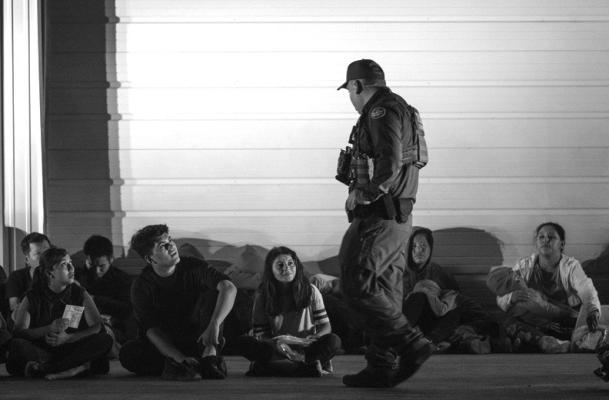Texas would enforce immigration laws under a bill that Senate panel advances
AUSTIN — Texas law enforcement officers would start enforcing immigration laws under a bill advanced by a Senate panel Thursday.
The proposal, by GOP Rep. Ryan Guillen of Rio Grande City, and sponsored by Sen. Brian Birdwell, R-Granbury, would create a new crime for a migrant who enters Texas illegally. It also establishes the “Texas Border Force” under the Texas Rangers and forbids local municipalities from limiting the authority or jurisdiction of the unit.
“Our hope is that the border protection force can help ease the burden on current resources and establish a program that can maintain operations in the border region,” Birdwell said.
The committee approved the bill on a 3-2 party line vote. It will now go to the full Senate.
The original proposal drew criticism and outrage because it would have allowed for U.S. citizens to apply to be on the unit and granted them authority to arrest or detain migrants that entered illegally — but only if they received the approval of Gov. Greg Abbott and the Public Safety Commission. Opponents said it would have created a “vigilante” unit.
Birdwell’s proposal removes citizens completely and only allows commissioned peace officers to serve on the new border force. The chief of the Texas Rangers, Jason Taylor, would serve as the unit chief. He would report to Department of Public SafetyDirector Steve McCraw.
The new unit is also a solution to Operation Lone Star — the multibillion-dollar border security effort using Texas National Guard members and DPS officers — Birdwell said.
“Our hope is that the border protection force can help ease the burden on current resources and establish a program that can maintain operations in the border region,” he said.
A migrant who enters Texas from Mexico illegally would be charged with improper entry, and would be charged with a Class A misdemeanor, which carries a penalty of up to a year in jail and a $4,000 fine. The charge could escalate to a felony if a migrant has previously been convicted of a crime.
The proposal will still likely test the limits of how far a state can go in enforcing federal immigration law.
Texas Attorney General Ken Paxton has told lawmakers in previous months he would like to challenge the precedent set by the Supreme Court in the 2012 Arizona vs. U.S. ruling.
The new conservative majority on the court, which has overturned Roe vs. Wade and struck down a restrictive New York gun law, might walk back some of the precedents set in that decision.
While the proposal says the border force unit would patrol areas contiguous with the U.S.-Mexico border, McCraw said that there might be a need for the unit to patrol three counties into Texas because of corridors to different cities.
“There’s no question about the smuggling that goes along in those corridors,” McCraw said. “I think we’re looking really at three counties in and, of course, it depends on the area.”
Several people opposed to the bill said it could negatively affect migrants and people of color.
Roberto Lopez, an organizer with the Texas Civil Rights Project, said the proposal further establishes white supremacy and would add to incarceration.
“White supremacy looks like white officers repelling brown children at the banks of the Rio Grande,” Lopez said. “Improper entry is a way to add more misdemeanors to stop people’s pathways to just imprison more people.”
Alexis Elicerio, the civic engagement organizer with La Unión de Pueblo Entero (LUPE), said people in the Rio Grande Valley are already living in fear because of Texas’ expansive border operations. He also disputed the supporters of the bill who said the legislation was not racist or xenophobic because Texas was only trying to secure the border.
“Those who say this bill is not racist or xenophobic are those privileged enough to not be targeted by these bills, unlike the families that we have there in the Rio Grande Valley,” he said.

